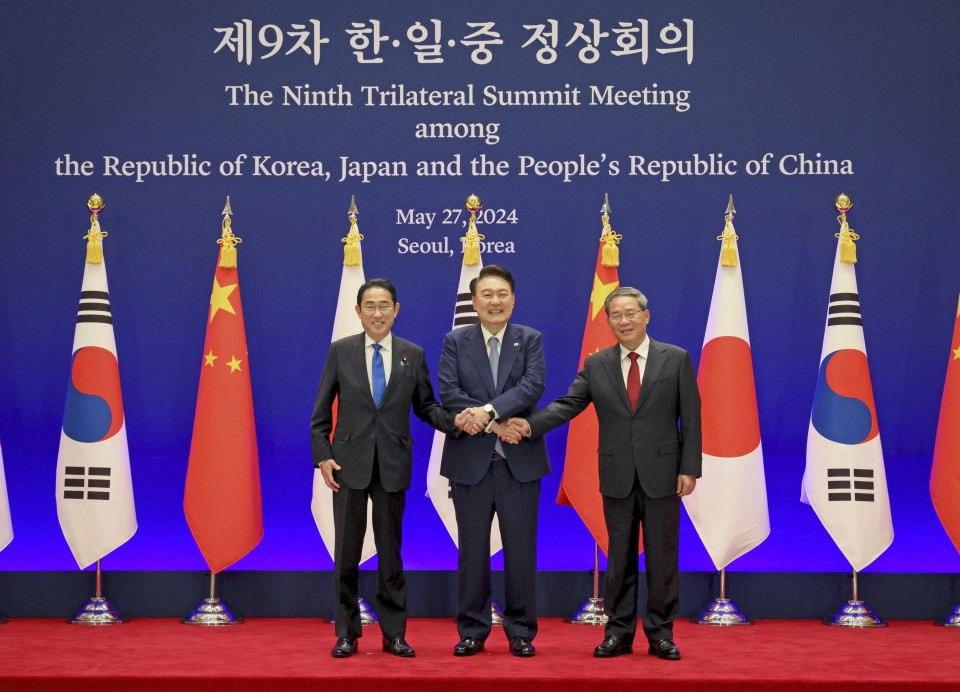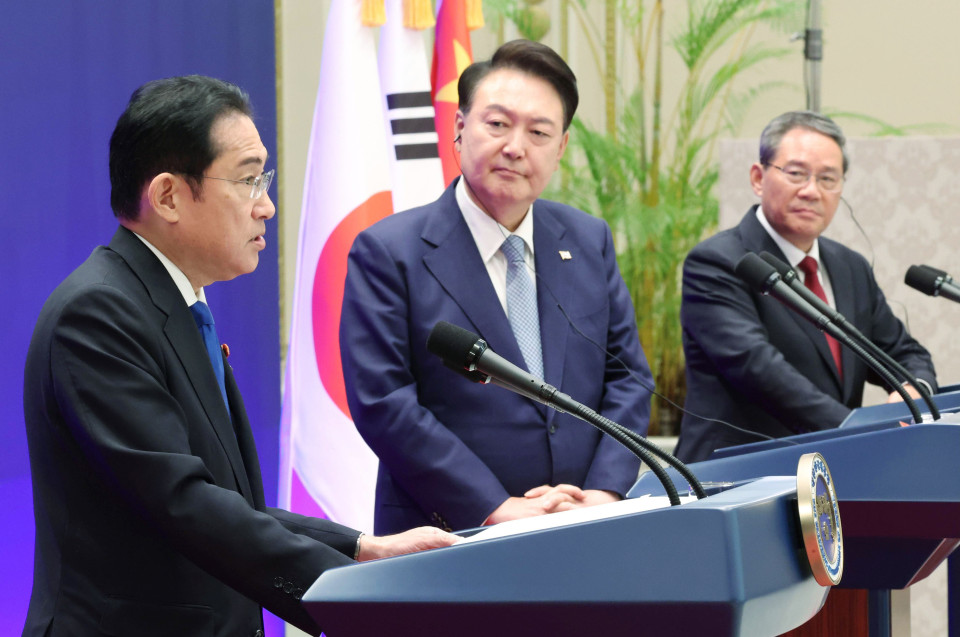While relations between Japan and South Korea have been improving for years, concerns have also been mounting that bilateral ties might worsen again in the future, casting a shadow over the security environment in East Asia.
Recently, Japan and South Korea have been bolstering security relations with the United States, as China, Russia and North Korea have been deepening military cooperation, especially since the Russian invasion of Ukraine began in February 2022.
But trilateral ties among Tokyo, Seoul and Washington may be shaky, given that South Korean politicians have often used anti-Japan sentiment to increase their popularity at home, which brings up negative memories between the two Asian countries.
As the minority ruling party of South Korean President Yoon Suk Yeol, who has extended an olive branch to Japan since taking office in May 2022, suffered a crushing defeat in April's general election, he might change his favorable attitude toward the neighboring nation.
In South Korea, Yoon's conservative People Power Party has been regarded as pro-Japan, while the left-leaning Democratic Party has adopted a hardline stance against the country that colonized Korea from 1910 through the end of the war in 1945.
"There is a risk" that Yoon's ability to "promote policy will decline significantly down the road with his political standing weakening," said Atsushi Ijuin, a senior researcher at the Japan Center for Economic Research.
Among the countries in the triangle, the Japan-South Korea relationship is "inherently fragile" as each of them have alliances with the United States but are not allies of each other, Ijuin said.
A Japanese government source well-versed in East Asian affairs said a worsening of ties between Tokyo and Seoul would "definitely benefit" China, Russia and North Korea, which would be "the worst-case scenario" for the region.
On Monday, Japan, South Korea and China held their trilateral summit for the first time in more than four years. The last time that the leaders of the three countries met was in December 2019, before the COVID-19 pandemic began in early 2020.

Yoon, Japanese Prime Minister Fumio Kishida and Chinese Premier Li Qiang, who took up the current position in March 2023, agreed to work together in addressing common challenges, including epidemics and the graying of their populations.
Kishida, who became premier in October 2021, said at a joint press announcement with Yoon and Li, "Our three countries, which share a great responsibility for peace and prosperity in the region, reaffirmed our determination to cooperate in a wide range of fields."
Japan, South Korea and China are supposed to hold trilateral summits annually on a rotating basis, but they have occasionally been suspended as Japan's relations with its two neighbors have chilled over historical and territorial spats.
Some analysts point out that even though trilateral summits take place, the outcomes only cover what the three nations can easily agree on, meaning such gatherings have become more meaningless as a way to resolve serious regional issues.
The latest summit was held as Tokyo and Beijing have been at odds over the Chinese ban on all Japanese seafood imports following the start of the release of treated radioactive water from the crippled Fukushima nuclear power plant in August 2023.
During their bilateral talks on Sunday, Kishida and Li traded barbs over China's increased military activities, days after Beijing conducted two-day drills around Taiwan, which it called a "strong punishment" for those seeking the island's independence.
Japan-South Korea ties, meanwhile, have recovered after Seoul proposed a solution in March 2023 for a long-standing wartime labor compensation dispute. Kishida and Yoon resumed reciprocal visits by countries' leaders for the first time in 12 years.
On Sunday, Kishida and Yoon agreed at their bilateral summit to join hands in further developing Japan-South Korea relations ahead of the 60th anniversary of the normalization of diplomatic ties in 2025, demonstrating a personal rapport between them.
At the previous trilateral summit in December 2019, Japan had been in a position where it had been "bullied by China and South Korea," but this time China was apparently "grilled" by the other two nations, a senior government official said.

However, even if the wartime labor dispute is resolved, Tokyo and Seoul are likely to keep facing several bilateral issues, such as a territorial row in the Sea of Japan and the treatment of Korean women in Japanese military brothels during World War II.
Japan has claimed that all problems stemming from its colonization of the Korean Peninsula were "completely and finally" settled under a bilateral agreement signed in 1965, but South Korea's anti-Japan politicians continue to brush aside the argument.
South Korea's majority opposition Democratic Party criticized the government in a statement released after Yoon's meeting with Kishida on Sunday, saying, "Is President Yoon Suk Yeol planning to sell out not only our past but also our future?"
The party added, "South Koreans have been expressing their frustration with President Yoon's unrequited love for Japan, saying that it has gone too far and is pathological."
Tomoki Iimura, a fellow at the Japan Institute of International Affairs, said South Korea's president, who serves a five-year term with no opportunity for reelection, is "prone to becoming a lame duck" after the ruling party loses the general election.
Given the possibility that a policy shift by South Korea's president could "directly affect" relations with Japan, Tokyo must continue "managing" issues with Seoul "in a cautious manner," the researcher said.
Japan needs to maintain close communication with South Korea "at various levels" in a bid to strengthen their trilateral cooperation with the United States, Iimura added.
(Dahee Kim contributed reporting)
Related coverage:
Japan, South Korea, China businesses groups to study cooperation
Japan, South Korea, China to pursue North Korea denuclearization: Kishida
Japan, South Korea to deepen ties ahead of 60th anniv.: Kishida
 By Tomoyuki Tachikawa,
By Tomoyuki Tachikawa,









